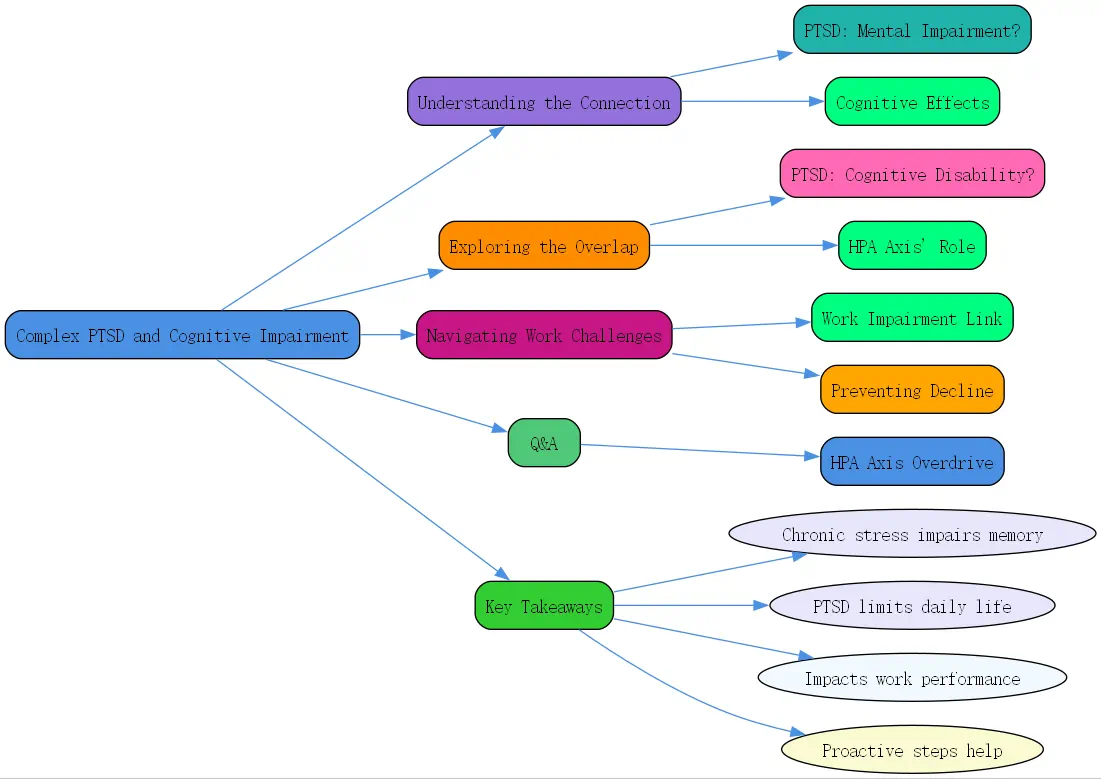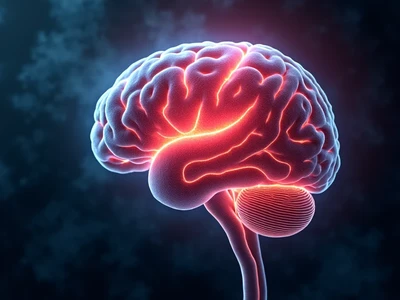Complex PTSD and Cognitive Impairment: Understanding the Connection

Complex PTSD and cognitive impairment often go hand in hand, impacting millions who’ve faced prolonged trauma. Unlike typical PTSD, complex PTSD stems from repeated stress, leading to deeper cognitive challenges. Understanding this link is key to managing its effects effectively.
Is PTSD a Severe Mental Impairment? Defining the Scope
PTSD emerges after traumatic events, marked by symptoms like flashbacks, avoidance, and mood shifts. Complex PTSD, however, arises from ongoing trauma—think childhood abuse—adding struggles with emotions and relationships. Both can hit cognitive functions hard, affecting memory and focus.
How do these differ from other conditions? PTSD ties to single events, while complex PTSD reflects chronic stress. Depression might mimic some symptoms, but its roots and criteria diverge. The American Psychiatric Association outlines distinct diagnostic paths for each.
Severity varies widely. Mild PTSD might disrupt sleep, but severe cases can derail daily life—think forgetting essentials or losing focus entirely. When chronic, PTSD can indeed rank as a severe mental impairment, reshaping how one navigates the world.
The Cognitive Effects of PTSD: A Detailed Look
PTSD’s cognitive toll is real. Memory falters—encoding new info or recalling old becomes a chore. Attention slips, making tasks feel overwhelming. Executive functions, like planning or impulse control, often weaken too, stalling decision-making.
Neurologically, PTSD rewires the brain. The hippocampus, memory’s hub, may shrink under stress. The prefrontal cortex, steering executive tasks, shows glitches, while the amygdala—emotion’s gatekeeper—overreacts. Research from the National Center for PTSD ties these shifts to trauma’s lasting echo.

Stress is the culprit here. High cortisol levels, spurred by trauma, turn neurotoxic, frying brain cells. This hits the hippocampus hardest, dulling memory and learning. For help, tools like the Managing Social Anxiety: A Cognitive Behavioral Therapy Approach Client Workbook offer practical relief, as BrainTalking suggests.
PTSD and Cognitive Disability: Exploring the Overlap
Could PTSD qualify as a cognitive disability? Its overlap with cognitive decline sparks debate. Let’s unpack the evidence and see how it plays out.
Is PTSD a Cognitive Disability? Examining the Evidence
Cognitive disabilities—like severe dementia—cripple mental faculties long-term. PTSD, primarily psychiatric, doesn’t always fit this mold. Yet, its cognitive effects can be brutal enough to blur the lines, especially in tough cases.
When PTSD hampers memory or focus, daily life suffers. Cooking dinner or managing bills might trip you up. If these limits persist, they could meet disability criteria under laws like the ADA, especially when they block major activities.
Support exists. Flexible schedules or quiet workspaces help, while therapy—think CBT—tackles root issues. BrainTalking notes that tailored accommodations can ease PTSD’s cognitive load, boosting independence and function.
The Role of Stress and the HPA Axis in Cognitive Decline
Stress drives PTSD’s cognitive decline via the HPA axis, our stress command center. Chronic activation floods the brain with cortisol and glutamate, creating a toxic brew. This shrinks neurons, particularly in memory-rich zones.
The fallout? Inflammation and oxidative stress pile on, damaging brain health further. Studies link this to hypertension and diabetes—conditions tied to dementia risk. High stress also fuels strokes, paving the way for vascular dementia, per 2025 research.
Counter it with action: mindfulness cuts stress, exercise boosts blood flow, and sleep restores. A diet packed with antioxidants shields neurons. These steps, rooted in science, help those with PTSD fend off cognitive decline.
PTSD and Work Impairment: Navigating the Challenges
Work life takes a hit with PTSD. Cognitive and emotional hurdles ripple out, affecting performance and relationships. Let’s explore this and how to cope.
PTSD and Work Impairment: Understanding the Connection
PTSD and work impairment clash daily. Trouble concentrating stalls projects—deadlines slip as focus fades. Memory gaps mean missed details, while emotional swings disrupt calm. Flashbacks can halt work entirely.
Team dynamics suffer too. Hypervigilance breeds mistrust, and withdrawal isolates. Colleagues might misread it as aloofness, straining bonds. The Department of Veterans Affairs flags these as common workplace woes for PTSD sufferers.
Accommodations make a difference. Remote work cuts stress, flexible hours ease pressure, and mental health resources—like the Managing Social Anxiety: A Cognitive Behavioral Therapy Approach Client Workbook—support coping. Educating teams fosters empathy and smoother collaboration.
Preventing Cognitive Decline: Strategies for Individuals with PTSD
Prevention starts with lifestyle. Exercise—30 minutes most days—lifts mood and sharpens thinking. A diet rich in omega-3s and greens fights inflammation. Sleep, at least 7 hours, resets the brain, staving off decline.
Cognitive training helps too. Puzzles, reading, or new skills keep the mind agile. Studies show these habits bolster memory and attention, even under PTSD’s strain. It’s like flexing a muscle—the more you use it, the stronger it gets.
Don’t skip support. Therapy unpacks trauma, while groups connect you to others who get it. BrainTalking stresses this combo—mental health care plus community—can slow cognitive slide and lift quality of life.
Q&A Section
Q: How does PTSD affect cognitive function?

PTSD messes with your head—literally. Trauma fires up the HPA axis, pumping cortisol and glutamate into overdrive. This combo turns neurotoxic, shrinking the hippocampus and dulling memory. Attention and planning take hits too, thanks to prefrontal cortex glitches. Stress also sparks inflammation, worsening the damage. Over time, it’s a recipe for cognitive decline, but steps like exercise, therapy, and stress management can fight back, keeping your brain sharper longer.
Key Takeaways
- Complex PTSD and cognitive impairment stem from chronic stress, hitting memory and focus hard.
- Is PTSD a severe mental impairment? Yes, when it cripples daily life with lasting symptoms.
- Cognitive effects of PTSD include memory loss, attention lapses, and executive struggles.
- Is PTSD a cognitive disability? It can be, if impairments limit major activities long-term.
- PTSD and work impairment challenge performance—accommodations and support can ease the load.
- Prevent decline with exercise, diet, sleep, and therapy—proactive steps make a difference.
By grasping how complex PTSD and cognitive impairment intertwine, you can take charge—protecting your brain and thriving despite the challenges. For more, check BrainTalking’s insights on mental health strategies.





